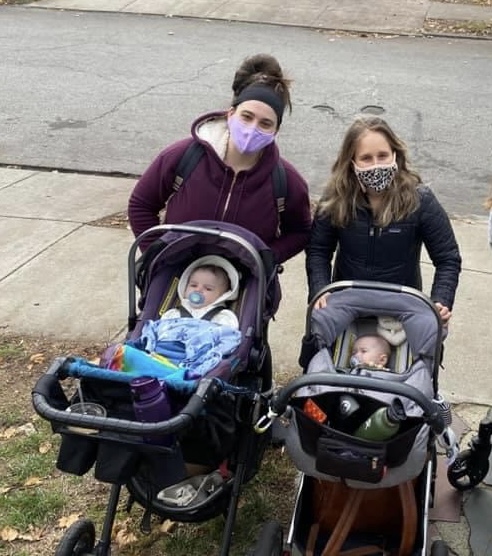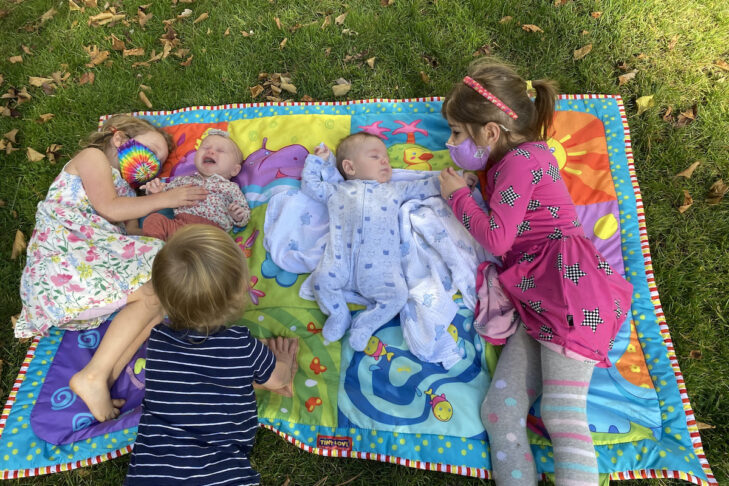We are two best friends from different countries who met when we were 16 on a teen trip to Israel. From there we spent our summers in beautiful Palmer, Mass., at Camp Ramah in New England. Never did we imagine living in the same city, let alone blocks from each other on two different occasions, having kids the same age and finding out in December 2019 that we were both pregnant with due dates mere days apart.
Unless you have been living under a rock, you have heard—or are yourself experiencing—how challenging being a parent during the pandemic has been. And if being a parent in the pandemic wasn’t hard enough, we are also part of the club of having pandemic babies—a true badge of honor. Unfortunately, there just isn’t anywhere to go to show off these badges (womp, womp).
When the pandemic started, we navigated staying safe during our pregnancies. Little to no information was available about our risk level as pregnant women, so we isolated. We did drive-bys, talked through cars, dropped off goodies and our 5-year-old daughters babysat each other through the iPad. Even with all of these skills we were building, we never imagined we would be birthing our babies all these months later, isolated not only from each other, but from our families and village. We had no playbook to follow.
In August 2020, we had babies just one day apart. We texted and FaceTimed from the hospital as we discussed birthing in a mask, our first glorious meal post-birth (sushi for Leora and an Italian sub for Robyn) and planned the reuniting with their siblings. There were no hospital visitors, or seeing the smiling faces of the nurses. Instead of planning lavish baby-namings/bris, we explored how to welcome our babies over Zoom. Beyond the innocence of baby snuggles, there was no normal.
We both went to our own homes, and in the coming weeks, where we should have been sitting on each other’s couches feeding our babies and watching the same shitty TV, we FaceTimed with each other, grieving a postpartum fourth trimester that wasn’t. We grieve the “what should have beens” while trying to remain grateful for what we have, mostly because social media tells us to do that. But, let’s be honest, there is a lot of loss. We have missed out on the joy of sharing our babies not only with our families and each other, but with the community. It has been and continues to be a lonely journey—even with each other just a phone call away.
There is so much to say about grief these days. Grief encapsulates tangible loss, which so many are experiencing, and we have each experienced in our own lives. However, grief also embodies the loss of what we hoped and expected.
Robyn is so lucky to have family nearby and a well-established relationship with a nanny, so she was hoping to help Leora with her family in Canada. Help right now could include so many things, like playdates for the 5-year-olds, taking turns working out and shushing each other’s crying babies so we could take a few more showers than we have been. Grief weighs on us as people and as mothers, and if we let ourselves think too hard on what could have been, the weight gets very heavy.
Needless to say, Jewish values have been woven into our lives from the beginning. Parenting during a pandemic has been no different. We have relied on our values to guide us on the “how-tos” related to this insanely challenging postpartum period of our lives. And thank god we have each other to reflect and hold each other accountable to these values in the most loving way possible.

Kehillah (community)
The value of community is one that Judaism holds high. We rely on our communities at every lifecycle event. Our community is so good at showing up for one another and creating a village. We feed each other, hold babies, take kids for ice cream dates. The idea of community is ingrained in who we are; from birth to death, we lean on our community.
This pandemic threw a real wrench in that. Well, we should say, it could have thrown a wrench in that. Unsurprisingly, our communities continued to show up. We each had a virtual ceremony to welcome our babies into the community, outdoor visits and meal trains. We were forced to find new ways to access our communities.
Pikuach nefesh (saving a life)
While we would like more than anything to be with our community, receiving the love and support that our community wants to give so badly, we recognize, even in times of deep sadness, that by staying home and not receiving the love and support we crave, we are saving our loved ones.
Pikuach nefesh has been a driving force in our postpartum risk assessment. We consider it at every turn. We would love nothing more than to just be in each other’s homes on the couch. We want to hold each other’s babies and take care of each other’s big kids. We had plans! Our maternity leave was supposed to be filled with long walks, coffee shops, exploring and possibly a music class here or there. We planned to embrace this maternity leave like we did with our first—filled with hugs, an abundance of love and visitors from our village and some adventures out in the world.
But the reality is that we are part of different circles. One of us has family nearby, which is the pandemic priority, and one of us is focused on respecting the rules of the school community. For this reason, we focus on pikuach nefesh and we stay masked and outdoors until the time comes when we can all snuggle.
We also reflect together on what feels ethical. Leora is from Canada and has had to make the difficult decision to not visit during the surges, even with a parent who has terminal cancer. Aunts haven’t met the new babe and it is so sad. We continue to have many conversations about exceptions to the rules or ways to go about visiting, but we always come back to pikuach nefesh.
Shalom bayit (peace in the home)
Lastly, we are always thinking about shalom bayit, sarcastically or not! As many people can relate, we have been in our homes for A [insert swear word of choice] LONG TIME. This means a magical, glorious, excessive amount of time with our spouses and children. While we are so blessed, we also are very annoyed (and annoying!). We have kept each other sane by being sounding boards for each other when the tipping point is getting too close.
Shalom bayit focuses on the happiness in the home, but without good friendships and support, the home would not be as happy. We have been there for each other through teenage years, weddings, losses, births and now a pandemic.
For now, we continue to wait, maybe not so patiently. We have no choice but to remain resilient. We feign confidence to our children to reinforce that all will be all right. We parent from a steady mindset whenever possible. Our options are to look forward and see the light at the end of this tunnel, even if we have to squint really, really hard. And, perhaps most importantly, we remember that friendship, sisterhood and love has been grounding and necessary right now.
Leora Kimmel Greene is the CEO and founder of One28 Strategic Events, a company that reflects her philosophy: that the planning process should be strategically challenging, a holistic representation of the host and stress-free. She lives in Boston with her husband, two daughters (5 and newborn) and dog, Roki. While she currently calls Boston home, she is a Canadian to her core and can be found planning her next trip “home.”
Robyn Isman is a therapist working with adolescents, teens and adults. She focuses on befriending our anxieties and using our strengths to build up resilience (especially useful during a pandemic). Robyn is also a wife, mom of three, business owner and tie-dye enthusiast.
This post has been contributed by a third party. The opinions, facts and any media content are presented solely by the author, and JewishBoston assumes no responsibility for them. Want to add your voice to the conversation? Publish your own post here. MORE

